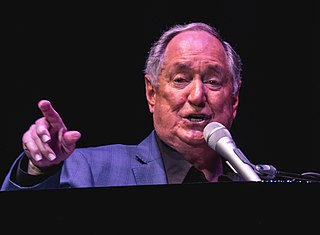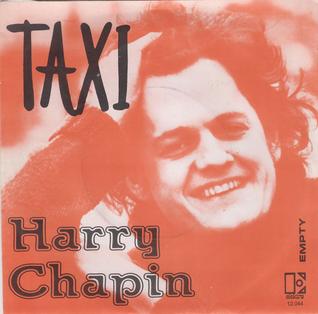
Harold Forster Chapin was an American singer-songwriter, philanthropist, and hunger activist best known for his folk rock and pop rock songs. He achieved worldwide success in the 1970s. Chapin, a Grammy Award-winning artist and Grammy Hall of Fame inductee, has sold over 16 million records worldwide.

Neil Sedaka is an American singer-songwriter and pianist. Since his music career began in 1957, he has sold millions of records worldwide and has written or co-written over 500 songs for himself and other artists, collaborating mostly with lyricists Howard "Howie" Greenfield and Phil Cody.

Sequel is the ninth studio album by the American singer-songwriter Harry Chapin, released in 1980. It was the last complete album released during Harry's lifetime. A tenth studio album, The Last Protest Singer, made up of material he was working on at the time of his death, was released about six years after he died.

Bret Michael Sychak, professionally known as Bret Michaels, is an American singer and musician. He gained fame as the frontman of rock band Poison who has sold over 50 million albums worldwide and 15 million records in the United States alone. The band has also charted 10 singles to the Top 40 of the Billboard Hot 100, including six Top 10 singles and a number-one single, "Every Rose Has Its Thorn".

"Cat's in the Cradle" is a 1974 folk rock song by Harry Chapin from the album Verities & Balderdash. The single topped the US Billboard Hot 100 in December 1974. As Chapin's only number-one song, it became the best known of his work and a staple for folk rock music. Chapin's recording of the song was nominated for the 1975 Grammy Award for Best Male Pop Vocal Performance and was inducted into the Grammy Hall of Fame in 2011.

"Piano Man" is a song written and performed by American singer-songwriter Billy Joel. As his first single in North America, it was included on Joel's 1973 album of the same name and later released as a single on November 2, 1973. The song is sung from Joel's point of view as a piano player at a bar, reminiscing about his experiences there and the people he encountered. "Piano Man" is based on Joel's real-life experiences as a lounge musician in Los Angeles from 1972 to 1973, which he had decided to pursue in an effort to escape his contracted New York City-based record company at the time, Family Productions, following the poor commercial performance of the album Cold Spring Harbor. Joel describes various characters, including a bartender named John and a "real estate novelist" named Paul, all based on real-life individuals.
"Blue Moon" is a popular song written by Richard Rodgers and Lorenz Hart in 1934 that has become a standard ballad. Early recordings included those by Connee Boswell and by Al Bowlly in 1935. The song was a hit twice in 1949, with successful recordings in the U.S. by Billy Eckstine and Mel Tormé.
"When You Walk in the Room" is a song written and recorded by Jackie DeShannon, released as a single on November 23, 1963, as the B-side to "Till You Say You'll Be Mine".

John Edward Berry is an American country music artist. Active as a recording artist since 1979, he has recorded more than 20 studio albums, including one platinum album and two gold albums. In his career, Berry has also charted 19 songs on the Billboard Hot Country Songs charts, including the Number One single "Your Love Amazes Me" from 1994 and six additional Top 10 hits: "What's In It for Me," "You and Only You," "Standing on the Edge of Goodbye," "I Think About It All the Time," "Change My Mind," and "She's Taken a Shine."

"Taxi" is a song written by Harry Chapin, released as a single in early 1972 to coincide with the release of his album Heads & Tales. It is an autobiographical ballad using first-person narrative to tell the story of a taxi cab driver meeting an old flame from his youth when he picks her up in his cab.

"Goldfinger" is the title song from the 1964 James Bond film Goldfinger. Composed by John Barry and with lyrics by Leslie Bricusse and Anthony Newley, the song was performed by Shirley Bassey for the film's opening and closing title sequences, as well as the soundtrack album release. The single release of the song gave Bassey her only Billboard Hot 100 top forty hit, peaking in the Top 10 at No. 8 and No. 2 for four weeks on the Adult Contemporary chart, and in the United Kingdom the single reached No. 21.

"W.O.L.D." is a song written and performed by Harry Chapin. The song is about an aging disc jockey who travels the United States seeking happiness, which he believes he will find by following his passion for being a radio broadcaster, only to discover that his life, looks, and voice have all passed him by, as hinted in the OLD of the title.

"The Bug" is a song written by Mark Knopfler and originally performed by Dire Straits on the final studio album by the band, On Every Street (1991). It was covered by Mary Chapin Carpenter in 1992, and also recorded on the albums Blues Ballads (1996) by The Alex Bollard Assembly and Keep Your Hands to Yourself (2002) by Mike Berry & The Outlaws.
"A Better Place to Be" is a song by Harry Chapin from his 1972 album, Sniper and Other Love Songs. The song is about a midnight watchman confiding in a waitress, while drinking gin, about a woman that he met a week before and had a one-night stand with.

"Everybody's Talkin' (Echoes)" is a song written and recorded by American singer-songwriter Fred Neil in 1966 and released two years later. A version of the song performed by American singer-songwriter Harry Nilsson became a hit in 1969, reaching No. 6 on the Billboard Hot 100 chart and winning a Grammy Award after it was featured in the film Midnight Cowboy. The song, which describes the singer's desire to retreat from the harshness of the city to a more peaceful place and an easier life, is among the most famous works of both artists, and has been covered by many other notable performers.
"30,000 Pounds Of Bananas," sometimes spelled "Thirty Thousand Pounds Of Bananas," is a folk rock song by Harry Chapin from his 1974 album, Verities & Balderdash. The song became more popular in its live extended recording from Chapin's 1976 concert album, Greatest Stories Live that started the phrase "Harry, it sucks." The song is based on an actual truck accident that occurred in Scranton, Pennsylvania, in 1965.
"You Gave Me a Mountain" is a song written by country singer-songwriter Marty Robbins during the 1960s. It has been recorded by many artists, including Robbins himself, but the highest-charting version of the song was by Frankie Laine in 1969. This version was included on Laine's album of the same name.
"I Wanna Learn a Love Song" is a song written and performed by Harry Chapin. The song was included on his 1974 album, Verities & Balderdash. The song is about a guitar teacher who gives guitar lessons to a woman who is falling in love with him.
"Sunday Morning Sunshine" is a song written and performed by Harry Chapin. The song was included on his 1972 album, Sniper and Other Love Songs. The song was released as a single the same year as his top 20 hit, "Taxi" and debut album, Heads & Tales. Cash Box described it as a "realistic look at city life." The song charted on the Billboard Hot 100, however it received more commercial success when it charted as a top 30 on the Billboard Adult Contemporary. The song has also been included on numerous posthumous compilation albums. King Biscuit Flower Hour recorded a live performance of the song for the show.

"Remember When the Music" is a song written and performed by Harry Chapin, from the album Sequel. The song is the next chronological single from his hit single, "Sequel" from the same album. It reached the top 50 on the Billboard Adult Contemporary chart and spent five weeks on the chart.













